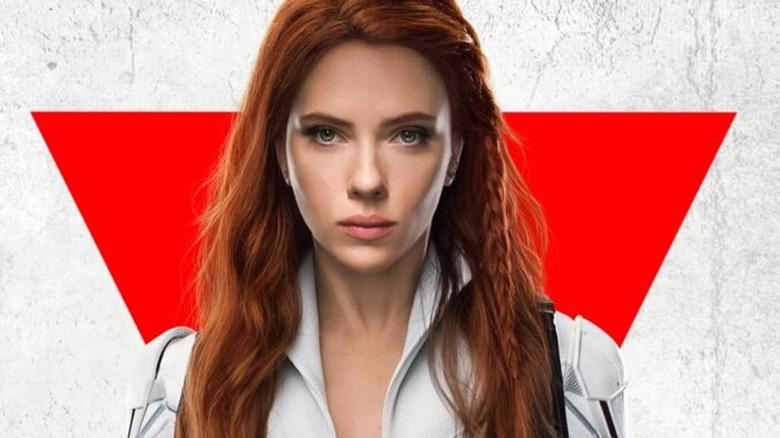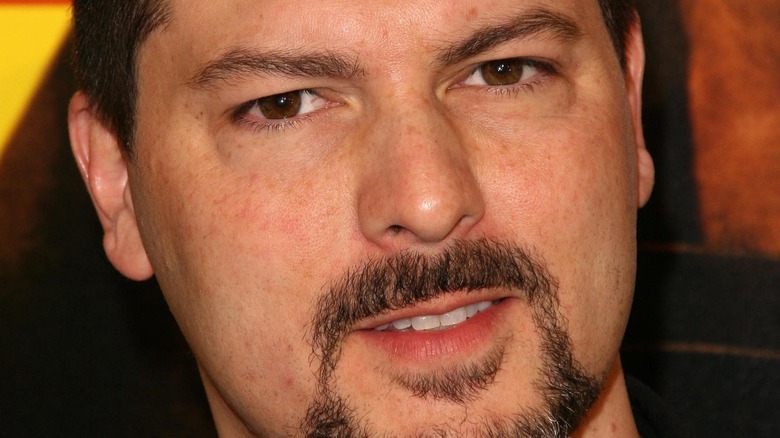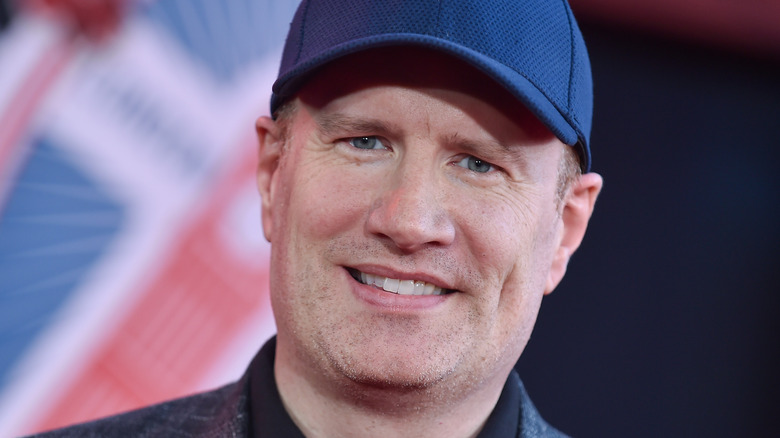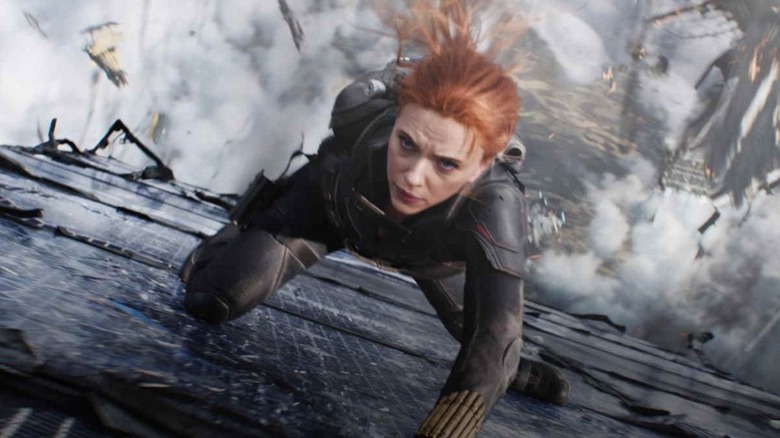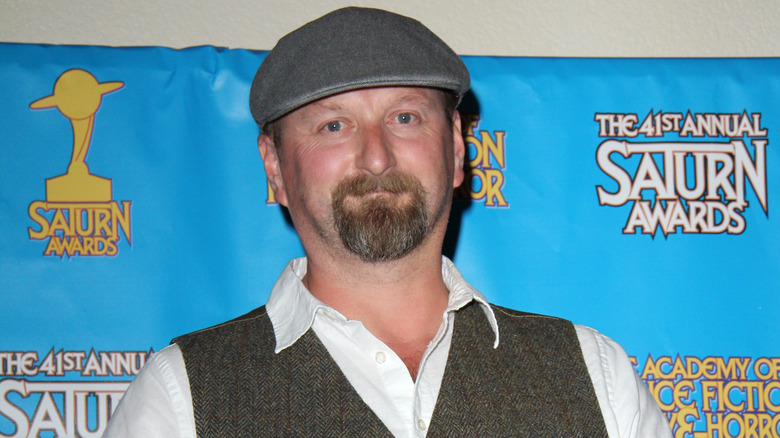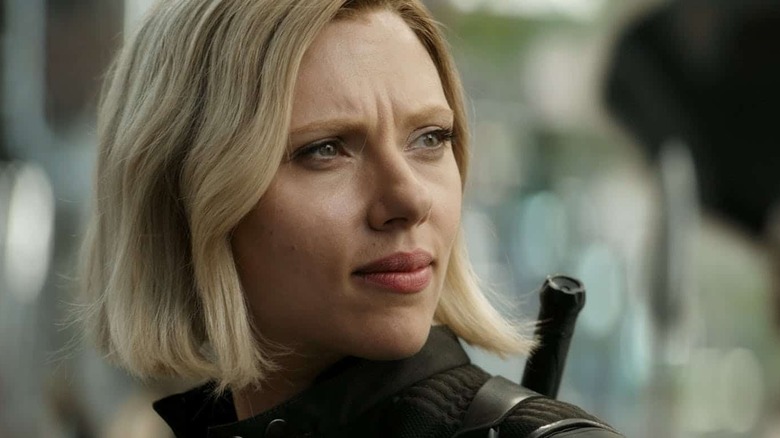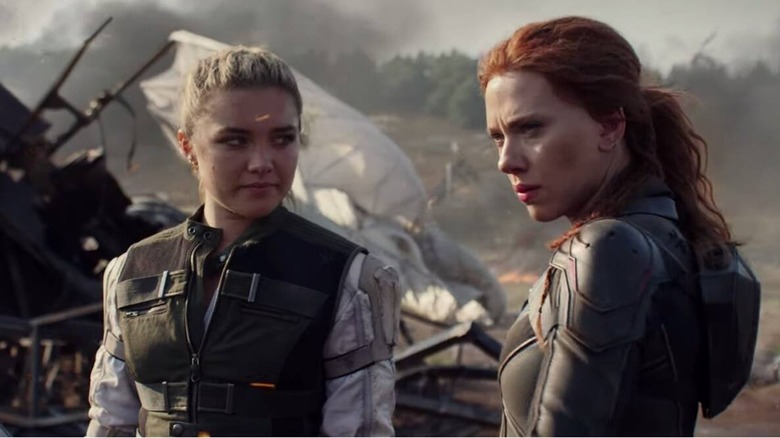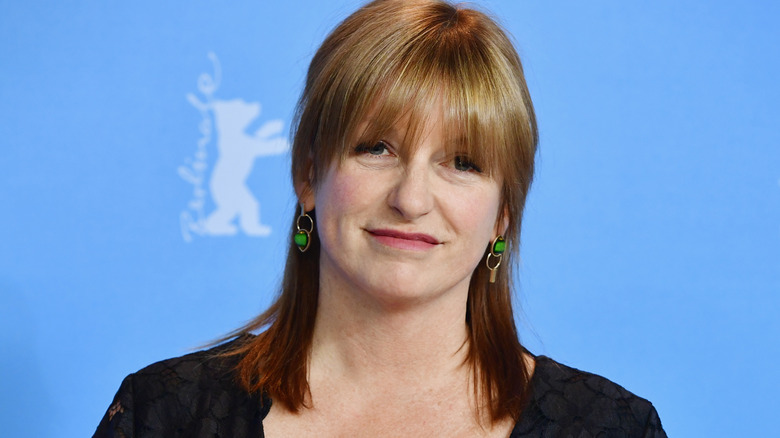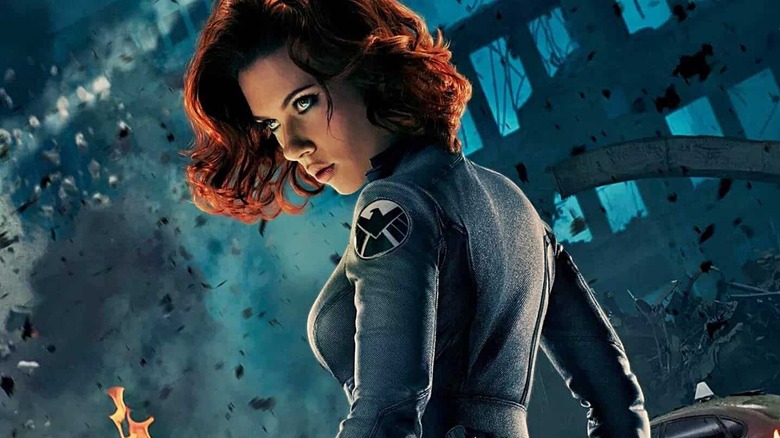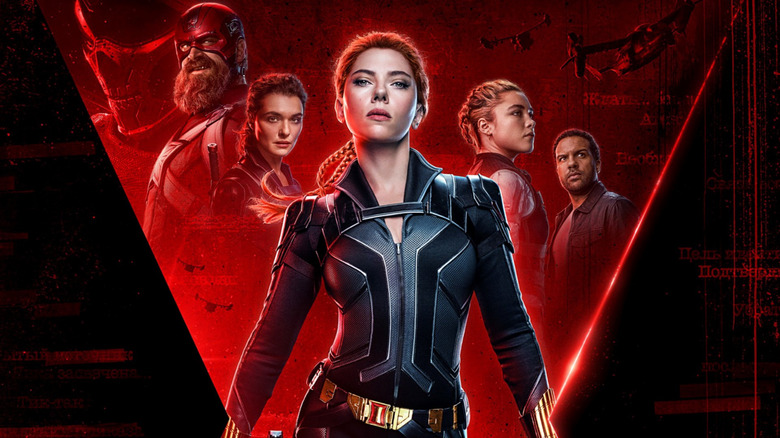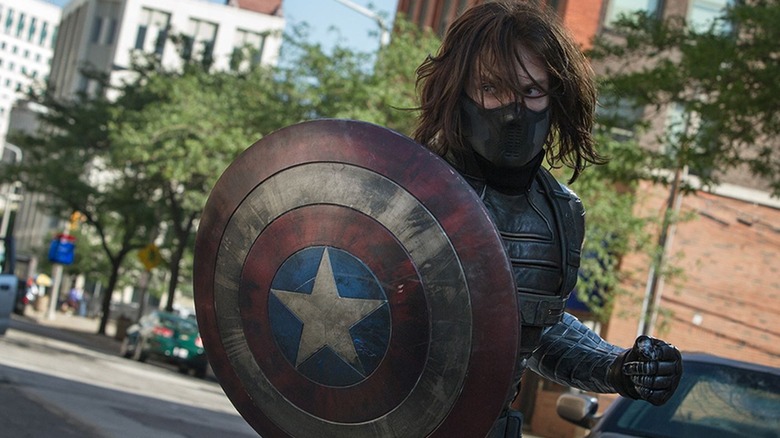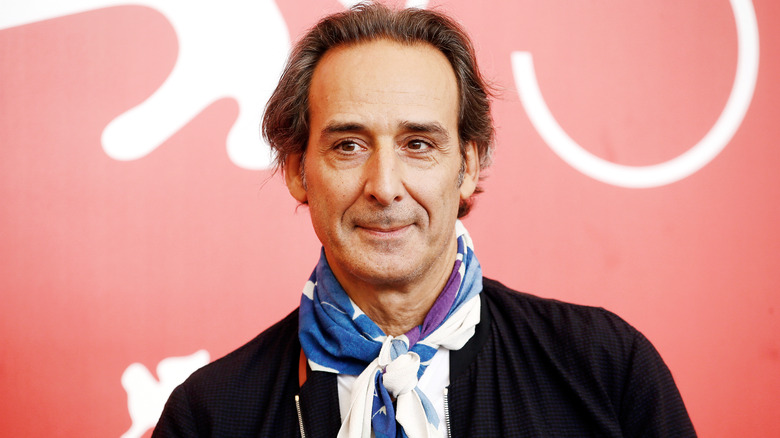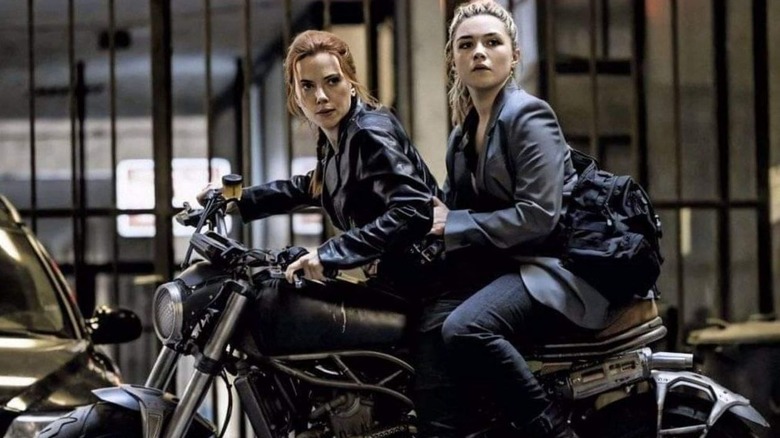Things You Never Knew About The Black Widow Movie
It's finally time for Black Widow to get her own movie. First debuting in the Marvel Cinematic Universe in "Iron Man 2" in 2010, demand for this character to receive a solo superhero movie has been rampant basically since she first stepped onto the screen. It seem like people have been waiting forever for the "Black Widow." However, believe it or not, the history of Black Widow's inaugural solo movie stretches back before the Marvel Cinematic Universe even kicked off in 2008.
Bringing this superspy to the big screen has been a long road full of stops, starts, and the occasional exciting breakthrough. These have included everything from high-profile directors expressing their desire to helm the project to the various production difficulties faced in finally getting the 24th movie in the Marvel Cinematic Universe off the ground. It hasn't been easy for Black Widow to get her solo outing, but with that motion picture finally a reality, there's no better time to look at little-known aspects of her movies voyage to the big screen.
The David Hayter version of Black Widow
Long ago, the film rights to the character of Black Widow were not in the hands of Marvel Studios. Rather, they were in the lap of Lionsgate, the studio whose only prior Marvel experience was inheriting the film rights to "The Punisher" after buying Artisan Entertainment. In April 2004, though, it was confirmed that Lionsgate was expanding its comic book film forays with a "Black Widow" movie helmed by David Hayter.
"I like that she crossed over into everybody else's comic books," Hayter said about his affection for the character per Superhero Hype. "She was the mysterious femme fatale in the story who did what was needed to be done and left." His longstanding affection for the character was so deep that it had inspired him to name his first daughter Natasha.
However, Lionsgate would eventually cancel the project. "Unfortunately, as I was [writing] the final draft, a number of female vigilante movies came out," Hayter explained regarding the film's demise, according to ComicBookResources. "We had 'Tomb Raider' and 'Kill Bill,' which were the ones that worked, but then we had 'BloodRayne' and 'Ultraviolet' and 'Aeon Flux.' 'Aeon Flux' didn't open well, and three days after it opened, the studio said, 'We don't think it's time to do this movie.' I accepted their logic in terms of the saturation of the marketplace, but it was pretty painful." With that, the Black Widow movie rights fell back into the hands of Marvel Studios.
Kevin Feige first talked about the film in September 2010
A solo "Black Widow" movie has been on the general public's wishlist for years now. It's also been something that Marvel Studios head Kevin Feige has been contemplating for an equally long period of time. Feige first divulged the possibility of the character receiving her own motion picture back in September 2010, just four months after "Iron Man 2" hit theaters.
"We've already started discussions with Scarlett about the idea of a solo movie and have begun putting together concepts," Feige revealed to IGN at the time. "But 'The Avengers' comes first." It was later revealed that Feige and Scarlett Johansson had begun discussing the prospect of a "Black Widow" movie in earnest in 2012 when the duo was promoting the first "Avengers" movies. Despite Feige's early initial insistence and discussions about this movie, not to mention all the fan demand, the "Black Widow" movie failed to materialize.
It would take another decade for a "Black Widow" feature to emerge, with the COVID-19 pandemic further prolonging the wait for the arrival of this film. Feige may have been pushing for this idea for as long as the fans, but the extended wait time indicates he wasn't in quite as much of a hurry to get to it as the biggest devotees of the superhero.
Nicole Perlman wrote a Black Widow treatment
Over the years, it felt like each new round of press promotion for the latest Marvel Cinematic Universe release would yield someone asking a Marvel Studios higher-up for some kind of update on a solo "Black Widow" movie. One of the tiny updates offered in this period was the news that a script treatment for a "Black Widow" feature had been penned by "Guardians of the Galaxy" screenwriter Nicole Perlman. The first woman to receive a screenplay credit on a Marvel Studios feature, Perlman reacted to this news breaking by taking to her Twitter account in 2014 to say that "Hey folks, before rumors get out of hand: I wrote a treatment for 'Black Widow' in 2010/2011, but I am not actively developing it right now."
Of course, there was no way that would be the end of Perlman talking about her experiences writing something connected to "Black Widow." She later divulged further details to Cineplix about her level of participation in this "Black Widow" movie. "The Black Widow project didn't get to the script phase," she remarked in August 2014. "It was just a treatment but it was pretty in depth, and hopefully one day we'll see it, fingers crossed!" It was one of several small but not especially impactful updates that would be given for the "Black Widow" movie for much of the 2010s.
Neil Marshall once threw his hat into the Black Widow ring
It's not surprising that certain filmmakers publicly lobbied for the chance to direct the "Black Widow." This included Neil Marshall, who would eventually find his way into directing a comic book movie with 2019's ill-fated "Hellboy" reboot. Long before then, though, Marshall expressed a specific desire to tackle the world of "Black Widow," a movie that could have served as a spiritual follow-up to other Marshall female-led action features like "Doomsday."
"I would love to do a 'Black Widow' movie," Marshall said to Vanity Fair right after expressing his fondness for the Scarlett Johansson project "Lucy." "That's perfect, I would love to do that. That character is really interesting, she doesn't have any superpowers, she just has extraordinary skills, and the world that she comes from, being this ex-KGB. assassin, I find that really fascinating, yeah." Marshall would, of course, not even end up on a shortlist to direct the eventual "Black Widow" movie, but his strong passion for tackling the production before it even got green-lit reflects how long people have been hankering for "Black Widow" to exist.
How Avengers: Infinity War informed Black Widow
Considering how long it took Marvel Studios to make a "Black Widow" movie a reality, it's easy to wonder why they decided to leap into doing one at the start of the 2020s. While the films leading lady, Scarlett Johansson, hasn't divulged specifics on what exactly has kept the project from existing for so long, she has revealed that the process of filming "Avengers: Infinity War" was a major impetus for getting "Black Widow" off the ground.
"This movie became more of a reality, I guess, when we were shooting 'Infinity War,' so I did know about the character's fate," Johansson explained to Collider. "It was helpful of course because it helped inform when we were talking about when this film would take place. That was important and also it was kind of nice in a way. There was no pressing urgency to make it, so we made it because we wanted to in a way, which is way better than making something because you have to." Now fully aware of the characters ending, Johansson was now fully committed to making a new solo "Black Widow" movie that looked at the character's life outside of the Avengers.
The project kicked into high gear with screenwriter Jac Schaeffer
At the start of 2018, something astonishing happened. The solo "Black Widow" took a significant step towards becoming a reality. Variety reported that Jac Schaeffer had been hired to pen the movie's screenplay. At the time, the outlet noted that a "Black Widow" film had not been properly greenlit yet by Marvel Studios brass but hiring Schaeffer to write a script was the most forward momentum the endeavor had yet to receive.
While the secretive nature of Marvel Studios has ensured that Schaeffer hasn't been able to talk openly about her entire experience writing for "Black Widow," she has noted that writing action scenes for this superspy was a massive departure from the kind of spectacle she wrote up on "WandaVision," a show she served as the head writer on. "The fighting [in Black Widow] is a lot of close contact, hand-to-hand combat," Schaeffer explained to Inverse. "It's very visceral. There's a lot of aggression and power in a very human way that I find really satisfying and really exciting to watch, but it's the polar opposite to writing for super-powered characters."
The extensive hunt for a director
Given the high profile nature of "Black Widow," it's no surprise that extra care was taken to find the right director for the project. Reports indicate that Marvel Studios was extra in-depth in their hunt, going through dozens of names — many of whom were filmmakers with solid indie cred.
In June 2018, a short piece from Deadline offered some clarity on this process, specifically stating that Marvel Studios initially had a list of 49 filmmakers they had been eyeballing to direct "Black Widow." This got whittled down to four choices, Amma Asante, Maggie Betts, Kimberly Pierce, and eventual directorial pick Cate Shortland. Apparently, Shortland was the member on this list of potential directors that had the most support from "Black Widow" leading lady Scarlett Johansson. Among the countless figures considered for this production were the late Lynn Shelton and Argentine cinema legend Lucrecia Martel.
Why Black Widow didn't go all the way back to the beginning
Where "Black Widow" would fit into Marvel Cinematic Universe continuity has long been a source of speculation. Would this project take place before any of Black Widow's main appearances in this franchise? Would it chronicle her youngest years and maybe even show her first encounter with Clint Barton? Now we have our answer: "Black Widow" takes place directly after the events of "Captain America: Civil War."
This was a conscious choice. Scarlett Johansson, for one, wanted to avoid the easily expected origin story route. "Yeah, post-'Civil War' felt like a good time to start," she explained to Collider. "I mean, we never intended to do an origin story. I never wanted to do an origin story because I just didn't want to go back. I wanted to move forward. Even though we are going back it all makes sense when you see it." She also noted that an advantage of setting the film in this part of the Marvel Cinematic Universe continuity was that, for Natasha Romanoff, "everything is gone and for the first time ever, really, she's just on her own." Those are the kind of stakes that would be lost if they'd just shown Romanoff's earliest years.
Black Widow's cinematographer switch
In bringing any major blockbuster to life, there are bound to be unexpected struggles. But "Black Widow" faced a particularly unique form of adversity through its difficulties holding onto a cinematographer. Collider tackled this streak of adversity in January of 2021 when the site noticed that the film's initial cinematographer, Rob Hardy, was no longer credited as part of the cast and crew. Though the movie's promotional materials, at the time, did not list a cinematographer, the site noted that sources had told them that Gabriel Beristain was now taking over this position on "Black Widow."
These same sources reported that Hardy had departed the project before it began filming and that Marvel Studios had then hired Gabriel Beristain to serve as the cinematographer for "Black Widow." This not Beristain's first time working on the camerawork for a major Marvel Cinematic Universe project. Having delivered additional photography for Marvel Cinematic Universe titles like "Thor: Ragnarok" and provided the cinematography for two Marvel One-Shot short films, the man was certainly well-versed in the world of Marvel.
The movies that inspired Black Widow director Cate Shortland
In directing easily the biggest movie of her career, "Black Widow" director Cate Shortland looked to other movies for inspiration. It wasn't just other MCU titles. Shortland had a unique list of features that would serve as a guiding hand for her inaugural foray into the world of blockbuster filmmaking.
"First, we looked at things like 'No Country for Old Men,'" Shortland explained to Fandango. "And then we looked at things like 'Thelma and Louise.' And the Marvel film — people that have seen it have said it reminds them of it — [is] 'Captain America: The Winter Soldier.'" As for what specific elements Shortland looked at in regards to "The Winter Soldier," she noted that "It's got great action. It's got a lot of heart, it's emotional. And at times, it can be a little bit dark, but then it opens up again. And it's really exciting. So I think that's like this film."
The loss of Alexandre Desplat as Black Widow's composer
"Black Widow" was almost the first Marvel Cinematic Universe title to be scored by Alexandre Desplat. Though well-known for arthouse fare like "The Shape of Water" or the last decade of Wes Anderson movies, Desplat has also been known to work on mainstream blockbuster flicks. These exploits have included the final "Harry Potter" movies as well as the 2014 "Godzilla" movie. Missing from his filmography is anything resembling a superhero title, with the closest he's come to the genre being his compositions for the 2017 comic book adaptation "Valerian and the City of a Thousand Planets."
Desplat was set to break that absence by providing the score for "Black Widow." Shortly after Desplat was revealed to be a part of "Black Widow," however, Lorne Balfe replaced him as a composer. The switch from Desplat to Balfe was an abrupt one and it was even more so for the Oscar-nominated composer himself. In an interview with IndieWire, Desplat would not delve into specifics on what happened with "Black Widow," only saying that "I was attached to that movie, and then I was detached." Whatever the circumstances behind this creative shift were, the "Black Widow" movie lost out on a chance to work with one of the more acclaimed film composers working today.
Black Widow experienced no tweaks even after all the delays
Thanks to the COVID-19 pandemic, "Black Widow" is arriving in theaters considerably later than originally intended. Once set to kick off the summer 2020 moviegoing season with a May 1st launch, "Black Widow" was subsequently postponed numerous times to various spots throughout 2020 and 2021. This was all due to the effects of the public health crisis, as Disney and Marvel Studios were constantly re-evaluating when it would be safe for people to head out and watch blockbusters on the big screen again. Eventually, "Black Widow" landed on a new date 14 months after it was initially supposed to come out.
With this in mind, it could be understandable to presume that "Black Widow" was further tweaked in all the time it took to finally bring it to the silver screen. After all, artists like George Lucas are always tinkering with their works long after they've been released, why not tweak a movie that's just lying on the shelf? However, in May 2021, Empire revealed that the team behind "Black Widow" had gone in the opposite direction. In all the time between its initial and final release date, "Black Widow" had never seen any alterations. What moviegoers would finally get to see in July 2021 was exactly what they would have seen in May 2020. Though its release date had frequently changed, the "Black Widow" movie had remained constant.
